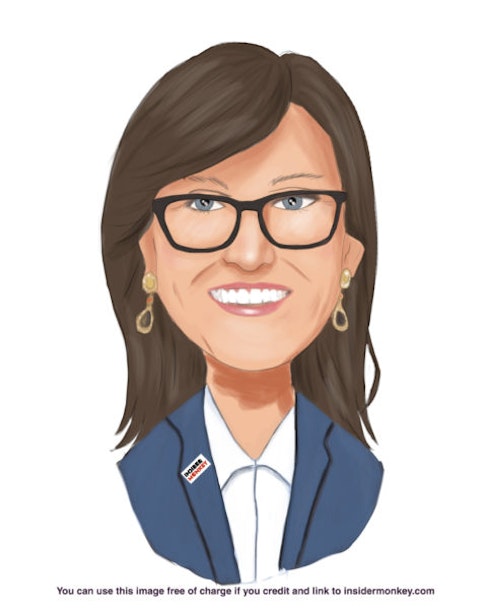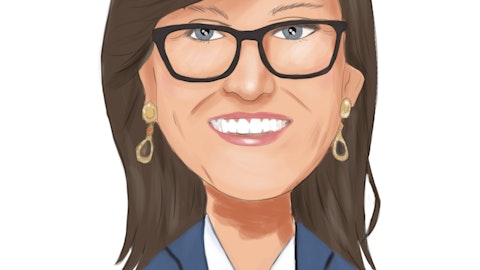In this article, we discuss 10 stocks that Cathie Wood is buying in September. If you want to see more stocks that Wood purchased this month, check out Cathie Wood is Buying These 5 Stocks in September.
The mass selloff in the stock market after August’s brutal inflation data was an opportunity for ARK Investment Management’s Cathie Wood to go on a buying spree. Bloomberg data suggests that ARK purchased 27 stocks across its 8 ETFs on September 13. The biggest acquisition was Roku, Inc. (NASDAQ:ROKU), which is already the third largest stock in the ARK portfolio.
Wood made prominent purchases on the day the NASDAQ-100 index posted its most abysmal one-day decline since March 2020, driven by increasing pressure of the Federal Reserve unleashing yet another huge rate hike in the week to come, in a desperate bid to control inflation. While inflation is the hot topic in the market and among policymakers, ARK’s Cathie Wood said in a tweet on September 12 that deflation is “in the pipeline”. Her latest purchases suggest that ARK is shaping up its portfolio to brace for the macro environment that will eventually unfold. Cathie Wood’s deflation call has received some high-profile supporters, such as Jeffrey Gundlach and Elon Musk, who believe that the Federal Reserve might push the economy towards deflation with such rate hikes.
Despite the 55% YTD decline in Cathie Wood’s ARK portfolio, she has remained true to her strategy of doubling-down on losing equities and exiting winners. Some of her most notable purchases in September include Roblox Corporation (NYSE:RBLX), NVIDIA Corporation (NASDAQ:NVDA), and Zoom Video Communications, Inc. (NASDAQ:ZM).
Our Methodology
We picked the most important BUY transactions initiated by Cathie Wood in the month of September.

Cathie Wood of ARK Investment Management
Cathie Wood is Buying These Stocks in September
10. Intellia Therapeutics, Inc. (NASDAQ:NTLA)
Number of Hedge Fund Holders: 27
Intellia Therapeutics, Inc. (NASDAQ:NTLA) is a Massachusetts-based genome editing company that develops therapeutics using CRISPR/Cas9 technology. On September 16, Cathie Wood’s ARK Innovation ETF purchased 235,373 shares of Intellia Therapeutics, Inc. (NASDAQ:NTLA). Intellia Therapeutics, Inc. (NASDAQ:NTLA) has consistently featured on the ARK portfolio since the first quarter of 2018.
Intellia Therapeutics, Inc. (NASDAQ:NTLA) stock gained about 12% on September 16 after the company reported interim data for its CRISPR therapeutic candidate, NTLA-2002, from a Phase 1/2 trial in hereditary angioedema (HAE). Given the data, Intellia Therapeutics, Inc. (NASDAQ:NTLA) has decided to test a 50 mg dose level for further evaluations in its Phase 2, placebo-controlled trial, which is expected to begin in H1 2023.
On September 16, RBC Capital analyst Luca Issi said that the full data disclosed by Intellia Therapeutics, Inc. (NASDAQ:NTLA) regarding interim results from its ongoing Phase 1/2 clinical study of NTLA-2002 for hereditary angioedema “raises a few questions”. However, when he sees “the bigger picture,” he remains impressed by the data, which he thinks should generate improved outcomes for patients. He maintained an Outperform rating and a $150 price target on Intellia Therapeutics, Inc. (NASDAQ:NTLA).
According to Insider Monkey’s Q2 data, 27 hedge funds were long Intellia Therapeutics, Inc. (NASDAQ:NTLA), compared to 35 funds in the earlier quarter. Andreas Halvorsen’s Viking Global is one of the leading stakeholders of the company, with 2.2 million shares worth $115.3 million.
Like Roblox Corporation (NYSE:RBLX), NVIDIA Corporation (NASDAQ:NVDA), and Zoom Video Communications, Inc. (NASDAQ:ZM), Cathie Wood has been bullish on Intellia Therapeutics, Inc. (NASDAQ:NTLA) lately.
Carillon Tower Advisers discussed its stance on Intellia Therapeutics, Inc. (NASDAQ:NTLA) in its Q2 2021 investor letter.
“Intellia Therapeutics is a clinical-stage genome editing company focused on the development of proprietary, potentially curative therapeutics. The company’s stock soared after announcing positive interim data from an ongoing phase 1 clinical study of its in vivo gene editing candidate, which is being developed as a single-dose treatment for hereditary transthyretin (ATTR) amyloidosis. This specific form of therapy would be the first of its kind resulting in the precision editing of a gene in a target tissue in the human body.”
9. DraftKings Inc. (NASDAQ:DKNG)
Number of Hedge Fund Holders: 27
DraftKings Inc. (NASDAQ:DKNG) was founded in 2011 and is headquartered in Boston, Massachusetts, operating as a digital sports entertainment and gaming company. Cathie Wood’s ARK Innovation ETF has bought 406,852 shares of DraftKings Inc. (NASDAQ:DKNG) so far during September, with the latest purchase made on September 13. DraftKings Inc. (NASDAQ:DKNG) was added to Wood’s portfolio in Q2 2022. DraftKings Inc. (NASDAQ:DKNG) shares have been bolstered recently, as the NFL season has just started, bringing traffic towards online gaming and betting platforms.
On September 14, Guggenheim analyst Curry Baker raised the price target on DraftKings Inc. (NASDAQ:DKNG) to $34 from $31 and maintained a Buy rating on the shares after updating the firm’s model to reflect strong week one outcomes in the NFL, robust downloads, and relatively improved DAU performance based on third-party app data.
According to Insider Monkey’s data, DraftKings Inc. (NASDAQ:DKNG) was part of 27 hedge fund portfolios at the end of Q2 2022, with collective stakes worth $682 million. HG Vora Capital Management is a significant stakeholder of the company, with 2.50 million shares valued at over $29 million.
Here is what Baron Small Cap Fund has to say about DraftKings Inc. (NASDAQ:DKNG) in its Q4 2021 investor letter:
“Shares of DraftKings, Inc. fell in the quarter, as stocks of online gaming companies were under pressure. Sports betting and i-gaming are rolling out with great fanfare and success across the country; however, investors seem concerned about competition and margins. Most participants are spending heavily on marketing and promotions, which is cutting into margins. We see this as a worthy investment in customer acquisition at a moment in time when revenues are just building. We continue to believe that online sports betting and gaming will be enormous industries, and that DraftKings will be a leading player. We think the business will have high margins as it matures. We believe we are underwriting the business conservatively and see much upside in the long term.”
8. Exact Sciences Corporation (NASDAQ:EXAS)
Number of Hedge Fund Holders: 28
Exact Sciences Corporation (NASDAQ:EXAS) is a Wisconsin-based provider of cancer screening and diagnostic test products in the United States and internationally. Cathie Wood’s ARK Innovation ETF added over 274,000 shares of Exact Sciences Corporation (NASDAQ:EXAS) to its portfolio in September, with the latest purchase made on September 13. Exact Sciences Corporation (NASDAQ:EXAS) has featured on the ARK portfolio since the third quarter of 2020. Despite beating Q2 2022 revenue forecasts, supported by robust screening revenue, the company lowered its full-year guidance.
On August 24, Credit Suisse analyst Dan Leonard initiated coverage of Exact Sciences Corporation (NASDAQ:EXAS) with an Outperform rating and a $55 price target. The company’s leadership in non-invasive colorectal cancer screening is “durable”, while upcoming pipeline catalysts could “de-risk future large opportunities”, the analyst told investors in a research note.
According to Insider Monkey’s Q2 data, 28 hedge funds were long Exact Sciences Corporation (NASDAQ:EXAS), compared to 32 funds in the previous quarter. Ken Griffin’s Citadel Investment Group is one of the leading position holders in the company, with 2.5 million shares worth roughly $100 million.
Here is what RiverPark Large Growth Fund has to say about Exact Sciences Corporation (NASDAQ:EXAS) in its Q4 2021 investor letter:
“Exact Sciences: EXAS shares declined on a disappointing recovery in Cologuard screening due to COVID. Despite continued revenue growth from Precision Oncology and COVID testing, and Cologuard screening revenue growth of 30%, COVID restrictions limited access to physicians’ offices for the company’s and its Pfizer Joint Venture sales force as well as causing a severe drop off of in-person wellness visits.
In the last year, Exact has also pivoted the company significantly from its single cancer screening tests (Cologuard for colon cancer and Oncotype for breast cancer) to multi-cancer screening through its Thrive acquisition, and to minimal residual disease and recurrence monitoring through its Ashion and Tardis acquisitions. Through this pivot, Exact has tripled its market opportunity from $20 billion to $60 billion.”
7. Teladoc Health, Inc. (NYSE:TDOC)
Number of Hedge Fund Holders: 32
Teladoc Health, Inc. (NYSE:TDOC) is a New York-based provider of virtual healthcare services in the United States and internationally. Cathie Wood’s ARK Investment Management added more than 151,000 shares of Teladoc Health, Inc. (NYSE:TDOC) to its portfolio in September. Wood started building a position in Teladoc Health, Inc. (NYSE:TDOC) back in Q1 2018.
On September 15, KeyBanc analyst Scott Schoenhaus initiated coverage of Teladoc Health, Inc. (NYSE:TDOC) with a Sector Weight rating. The analyst observed that the digital health sector is becoming more fragmented as competition in the market increases. He views app user data as an indicator of the competitive market, noting that there has been stunted growth in app users in both Teladoc Health, Inc. (NYSE:TDOC)’s core legacy telehealth business and its acquired chronic care business.
Among the hedge funds tracked by Insider Monkey, Teladoc Health, Inc. (NYSE:TDOC) was part of 32 public stock portfolios at the end of June 2022, compared to 36 funds in the prior quarter. Jim Simons’ Renaissance Technologies is a prominent stakeholder of the company, with 4.5 million shares worth $148.6 million.
Here is what Greenhaven Road Capital has to say about Teladoc Health, Inc. (NYSE:TDOC) in its Q1 2022 investor letter:
“Teladoc is the largest telehealth provider in the US and has recently begun to expand internationally. TDOC’s platform enables an ever-expanding list of patient-doctor interactions (including those for primary health care, mental health issues and chronic condition management) to transition from an on-site visit to one that can be done remotely with full video- based interaction. TDOC provides its platform of services on both a business-to-business and direct-to-consumer basis, through monthly subscription-based relationships. For its core business-to-business clients, the company contracts with a wide range of entities, including large scale employers (the company currently contracts with over 50% of the Fortune 500), health plans, health systems, and medical insurance companies, which currently cover more than 50 million members. For these customers, the company provides a win-win-win, as patients spend no time traveling and less time waiting, doctors are more efficient seeing more patients in less time, and payers (employers and plan sponsors) save money while being able to offer a highly popular additional benefit for their employees. This B to B market is projected to be a +$100 billion market opportunity and TDOC is the clear global market leader. For its direct-to- consumer clients, the company provides a growing suite of services for individuals to have affordable access to on-demand and scheduled medical services, for which their current insurance does not provide reimbursement (such as extended mental health counseling).
Although the company has been growing steadily for well over a decade, the business has transformed over the past few years as the COVID pandemic caused a significant increase in the demand for virtual healthcare. In addition, the company’s 2020 acquisitions of Livongo, the leader in virtual chronic condition management, and InTouch, a competitive telehealth platform, materially broadened the company’s product offerings. At its recent analyst day, management guided to 25-30% top line growth for each of the next three years, exiting 2024 with more than $4 billion in annual revenue. The company also anticipates expanding margins by 100-150 basis points per year in each of the next three years, while still accelerating its investments in marketing and R&D. As with many of our recent purchases, we took advantage of the decline in the company’s shares (down a breathtaking 70% from its 2021 high of almost $300 per share) to establish a small position in Teladoc.”
6. Roku, Inc. (NASDAQ:ROKU)
Number of Hedge Fund Holders: 34
Roku, Inc. (NASDAQ:ROKU) is a California-based company that operates a TV streaming platform. Roku, Inc. (NASDAQ:ROKU) has been part of the ARK portfolio since the second quarter of 2019. On September 13, Cathie Wood purchased an additional 250,537 shares of Roku, Inc. (NASDAQ:ROKU).
Pivotal Research analyst Jeffrey Wlodarczak upgraded Roku, Inc. (NASDAQ:ROKU) on September 8 to Hold from Sell with a price target of $60. The stock reached a properly balanced risk/reward level and profits should be reaped on short positions, the analyst told investors in a research note. He cited the “more encouraging backdrop and a retrenchment in the valuation” for the upgrade to Hold. However, the analyst still believes that Roku, Inc. (NASDAQ:ROKU) is “getting hit materially harder than its advertising peers”.
Among the hedge funds tracked by Insider Monkey, 34 funds were bullish on Roku, Inc. (NASDAQ:ROKU) at the end of Q2 2022, with collective stakes worth $1.40 billion. Paul Marshall and Ian Wace’s Marshall Wace LLP is one of the leading position holders in the company, with 933,118 shares valued at $76.6 million.
In addition to Roblox Corporation (NYSE:RBLX), NVIDIA Corporation (NASDAQ:NVDA), and Zoom Video Communications, Inc. (NASDAQ:ZM), Cathie Wood was seen pouring into Roku, Inc. (NASDAQ:ROKU) during September.
Here is what RGA Investment Advisors had to say about Roku, Inc. (NASDAQ:ROKU) in its Q4 2021 investor letter:
“Since we bought Roku, no stock has contributed more to our returns and no stock has been more volatile in our portfolio. This is now our third drawdown in the stock of over 30% and our second of over 60%. Fortunately (or tactically) before the two 60% drawdowns we had trimmed our positions by at least a third, though unfortunately that meant we still held large slices of the stock on the way down. Despite the stock having soared too far, too fast and thinking it was due for a period of digestion, we believe over our time frame even the former highs will be rewarded with a good result. We have often pointed out that volatility in companies like Roku is the market’s way of grappling with a really wide range of potential outcomes and that remains as true today as ever, though the range of outcomes continues to narrow for the better for Roku.
Roku today is trading at lower multiples than at any point as a public company, meanwhile its revenue and margin composition has evolved from majority hardware to vast majority platform– in other words, each $1 of revenue is much more valuable today than ever before for Roku. Roku today is a profitable company for the first time in its history. Roku today has a multitude of investment opportunities within its own platform that can drive considerable value. Early in 2021 at higher prices, one had to believe the company would grow accounts internationally to justify valuations. This was so, because the company has so quickly achieved substantial penetration of the US market with 56.4m reported household customers of the ~130m total US households, that further growth in the US household count will be challenging and because prices were so high. Today, one merely needs to believe that with around 60 million households (the expectation for the yet reported year-end 2021 number), ARPU has a strong enough growth tailwind to reach $100 within a reasonable time, without relying on any incremental account growth. For context, as of Q3 this year, ARPU was $40, up 49% year-over-year and we know it will be higher in Q4. Growth in ARPU is underpinned by the continuing migration of viewer hours to CTV. The subforces behind this are increasing the penetration of Roku devices within households (go from one Roku to TV to 2-4), increasing the hours that each house watches (getting from shy of 4 hours to the nearly 8 hours an average American household watches TV) and broadening the content on the platform, increasing the share of inventory with content companies and more hours (like live sports viewing) shifting from linear to CTV. We further believe the opportunity to become the bundler and/or hub of household content subscriptions is growing, as evidenced by the rise in credit card pings per user from 1 to 1.3 per month and its continuing ascension. In this respect, Roku has the right to win with their installed base, because the experience is exponentially better than legacy and competing offerings…” (Click here to see the full text)
Click to continue reading and see Cathie Wood is Buying These 5 Stocks in September.
Suggested articles:
Disclosure: None. Cathie Wood is Buying These 10 Stocks in September is originally published on Insider Monkey.


